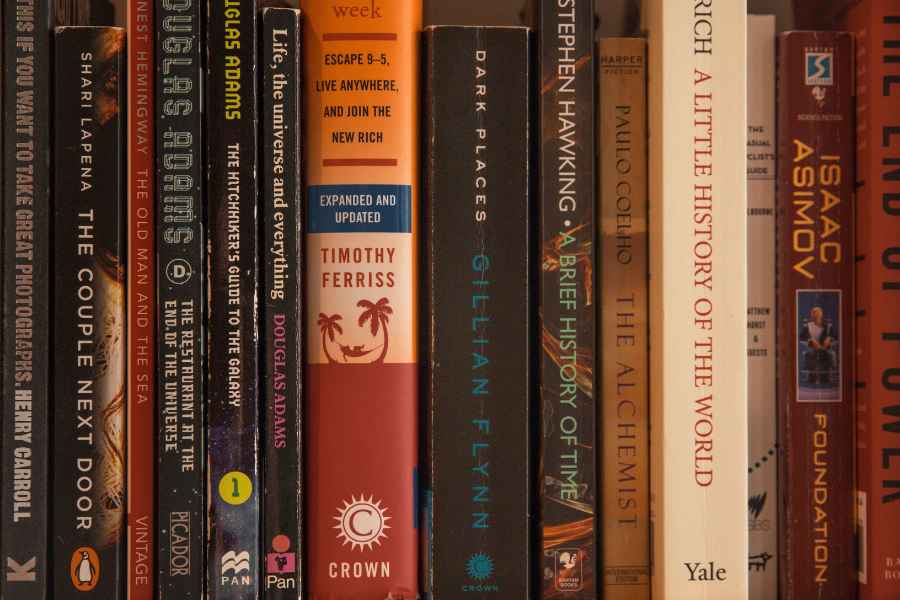Have you ever wondered, “How much do authors make?”
It’s a question that many aspiring writers want to know, and the answer is: it depends.
But don’t worry, the answer doesn’t end there!
In this article, we’ll delve into the intricacies of book author earnings — from traditional publishing paychecks to the potential windfalls of self-publishing.
Together, we’ll explore income sources, analyze key influencing factors, and embrace proven strategies to prepare you to navigate the literary financial landscape.
Ready?
Let’s dive in.

Author Earnings: Traditional vs. Self-Publishing
The world of publishing has evolved, and with it, paths to financial success for authors have diverged into two primary paths: Traditional and self-publishing.
Both methods offer distinct revenue models and author salary ranges.
Let’s dive into how each model works!
Traditional Publishing
Traditional publishing, often regarded as the “classic” approach to getting a book out into the world, begins when an aspiring author often seeks representation from a literary agent.
Agents are well-connected professionals who understand the market dynamics and have strong relationships with major publishing houses. They pitch promising works to publishers they believe might be interested.
Once a manuscript piques the interest of a publishing house, negotiations commence. This is where book advances and book royalties come into the picture.
A book advance is essentially a forward payment given to the book author, with the expectation that the book will earn this amount back in sales.
For beginner authors, advances can range from a modest $1,000 to $10,000. However, for well-established authors with proven track records, this figure can soar into the hundreds of thousands or even millions.
After an advance, we step into the realm of book royalties. These are continuous payments made to authors based on the number of copies sold.
Royalties usually range from 7% to 15% of the book’s sale price, depending on factors like the format of the book (hardcover vs. paperback) and the total number of copies sold.
It’s after the book advance has been “earned out” through sales that the royalties start trickling into the author’s account.
Now, it’s worth noting that the journey to a traditionally published author can be a long one.
Securing an agent, getting a book deal, and finally seeing the book on shelves can take years.
But for those who navigate it successfully, the rewards, both in terms of recognition and revenue, can be immense.
Traditional Publishing Summary
- Credibility and Prestige: Being backed by a renowned publisher can bestow a certain level of prestige upon an author. It can open doors to literary awards, critical reviews, and even film adaptations.
- Professional Support: From editorial guidance to marketing muscle, traditional publishers bring a team of seasoned professionals who handle various aspects of the book’s journey, allowing the author to primarily focus on writing.
- Retail Distribution: Traditional publishers have the clout to get books into brick-and-mortar stores, ensuring a wider reach.
- Tough Entry Barrier: Landing a deal can be challenging. It often requires securing a literary agent first, which in itself is no small feat.
- Lower Royalties: Typically, a book royalty for traditionally published authors ranges from 7% to 15% of the book’s retail price.
- Less Creative Control: From the book’s cover design to certain editorial choices, authors might have to cede some creative decisions to the publisher.
Self-Publishing

The landscape of the literary world witnessed a seismic shift with the advent of self-publishing.
Once dismissed as a second-rate path for those unable to secure a traditional book deal, self-publishing has metamorphosed into a legitimate and often lucrative route for many authors.
Thanks to technological advancements and platforms like Amazon Kindle Direct Publishing (Amazon KDP), Smashwords, and Lulu, barriers to entry have been obliterated.
Self-published authors, in essence, become their own entrepreneurs.
They’re responsible for every facet of the book’s journey, from its creation to the book sale. This direct control also means they keep a more substantial portion of the profits.
While traditional publishing royalties hover between 7% to 15%, a self-published, independent author can expect a higher book royalty rate. Anywhere from 35% to 70% of the book sale price, depending on the platform and pricing strategies employed.
However, the upfront costs in self-publishing are often shouldered by the authors. These can include professional editing, cover design, and book marketing.
If an author can skillfully navigate these initial investments and their book resonates with readers, the financial returns can be compelling.
Many self-published authors report earnings of $1,000 to $5,000 in their first year, with potential for growth as they publish more works and establish a loyal readership base.
Then there are the outliers, the self-published supernovas, who’ve seen six or even seven-figure annual earnings, solidifying the notion that success isn’t exclusive to the traditional route.
For example, the rise of self-publishing, buoyed by success stories of authors like E.L. James and Amanda Hocking, signifies a democratized era in publishing.
It’s a world where the power dynamics have shifted, allowing authors greater autonomy over their creations and the profits they generate.
The gamble here is higher, as is the potential reward. It’s about understanding the market, harnessing the right tools, and having the tenacity to see it through.
Self-Publishing Summary
- Higher Royalties: Self-published authors can earn anywhere from 35% to 70% of the book’s sale price.
- Full Creative Control: Every decision, from the book’s content to its cover, lies in the hands of the author.
- Speedier Process: Without the need to pitch and secure a deal, authors can get their book to market faster.
- Upfront Costs: Authors bear the initial expenses for editing, cover design, and marketing.
- Marketing Responsibility: With no established publishing house behind them, self-published authors must often become adept marketers to ensure their book’s visibility.
- Stigma: Despite its growth, some circles still view self-publishing with a degree of skepticism.
The Verdict
Ultimately, choosing between traditional and self-publishing isn’t a matter of which is objectively better but which aligns more with an author’s goals, strengths, and values.
For those seeking validation from industry gatekeepers, the prestige of a traditional publishing deal might be the dream.
However, those who value autonomy, higher profit margins, and the thrill of entrepreneurship might lean towards self-publishing.
That said, whichever path you choose, there are certain principles of success and actions you can take to increase your earning potential…
4 Fundamental Factors that Influence an Author’s Earning Potential

From genre selection to personal branding, the following elements can drastically impact an author’s financial success.
1. Genre Choice
Choosing the right book genre is the first step in maximizing your potential earnings.
Some genres perennially enjoy vast readerships, leading to robust sales. The romance genre, for example, boasts a dedicated following, with authors like Nora Roberts and Nicholas Sparks, who have carved out impressive fortunes.
Thrillers and mysteries, with their page-turning qualities, have also consistently been high performers, led by authors like Stephen King and Agatha Christie.
Conversely, less well-known niche genres may not offer the same earnings potential.
However, even within niche realms, standout authors can carve a name for themselves. Think of Naomi Novik in the realm of historical fantasy or Charlaine Harris with her supernatural mysteries.
The sweet spot for most authors lies at the intersection of market demand and personal passion. And recognizing this balance can pave the way for both fulfillment and financial success.
2. The Power of Platform
An author’s platform, which includes social media profiles, a website, and engagement tactics like newsletters, provides direct access to readers.
Think of it as your virtual storefront, where you can foster a community, offer exclusives, or even just share your journey. The stronger your platform, the more likely readers will be to invest in your work, both emotionally and financially.
This is true for both traditional and self-published authors, although arguably more so for the latter.
For example, take bestselling science-fiction/fantasy author Brandon Sanderson, who is both traditionally and self-published.
His website is a resource hub with blog posts and behind-the-scenes insights. He posts regular updates and resources on his Youtube channel, engages with fans on Reddit, and fosters a powerful fan community through live events and more.
For aspiring authors, intertwining compelling writing with strategic platform building and branding can be the difference between modest readership and widespread recognition.
As with the art of writing, the key to building an effective platform is to remain authentic, engaging, and attentive to the changing dynamics of reader interactions.
3. Marketing Mastery

No matter how compelling your book is, it won’t generate sales if readers aren’t aware of it.
And that’s where marketing comes in.
While the platform lays the foundation for an author’s presence, marketing is the active force that projects that presence far and wide.
Traditional publishers often bring with them the promise of visibility — press releases, features in literary magazines, or placement in notable bookstores.
However, a savvy author complements these efforts with personal initiatives. Hosting webinars, attending conventions, or even writing guest articles can create ripples in the literary pond.
For the self-published author, the weight of marketing is more pronounced, and digital tools are usually your best bet.
For example, a savvy self-published author will learn to harness the power of Amazon’s promotional capabilities, plumb the depths of targeted social media ads, engage readers through platforms like Goodreads, and more.
It’s also about leveraging the assets you’ve already built. If your platform already has a substantial email subscriber list or a bustling social media page, regular updates about your book, teaser chapters, or even cover reveals can drum up anticipation.
Remember, in the vast literary marketplace, marketing isn’t just about selling a book — it’s about selling the experience, the world you’ve crafted, and most crucially, selling yourself as a storyteller.
4. Skill & Output
Finally, remember: Writing isn’t just about inborn talent. Like any craft, it gets better with practice, feedback, and sheer determination.
Consider Stephen King, who amassed a mountain of rejection letters before tasting success. His dedication to refining his craft turned those early “no’s” into a legacy of bestsellers.
Then there’s the importance of disciplined output.
Take, for example, Neil Gaiman, who has dished out novels, graphic novels, children’s books, and more over his decades-long career.
He’s not just a writer; he’s an industry in himself, partnering on merchandise and special editions to boost his earnings.
In short, don’t rest on a single success. Keep honing your craft, diversify your portfolio, and remember: the literary world rewards those who blend skill with consistent, varied output.
So… How Much Do Authors Make? Your Journey Forward
“How much do authors make?” might have been the burning question that led you here, and now, you’re not just armed with an answer but a roadmap.
Through understanding publishing landscapes, recognizing key income factors, and employing growth strategies, you’ve unlocked the doors to potential success.
Harness this knowledge, let it guide your decisions, and fuel your passion. With every story you craft, remember the power behind each word, each decision.
So keep writing, and let your success be the truest answer.
The post How Much Do Authors Make in 2023? (+ 4 Key Income Factors) appeared first on Smart Blogger.
from Smart Blogger https://ift.tt/AgiPdMV
via IFTTT
No comments:
Post a Comment